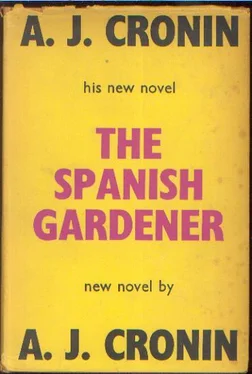Archibald Cronin - The Spanish gardener
Здесь есть возможность читать онлайн «Archibald Cronin - The Spanish gardener» весь текст электронной книги совершенно бесплатно (целиком полную версию без сокращений). В некоторых случаях можно слушать аудио, скачать через торрент в формате fb2 и присутствует краткое содержание. Жанр: Классическая проза, на английском языке. Описание произведения, (предисловие) а так же отзывы посетителей доступны на портале библиотеки ЛибКат.
- Название:The Spanish gardener
- Автор:
- Жанр:
- Год:неизвестен
- ISBN:нет данных
- Рейтинг книги:4 / 5. Голосов: 1
-
Избранное:Добавить в избранное
- Отзывы:
-
Ваша оценка:
- 80
- 1
- 2
- 3
- 4
- 5
The Spanish gardener: краткое содержание, описание и аннотация
Предлагаем к чтению аннотацию, описание, краткое содержание или предисловие (зависит от того, что написал сам автор книги «The Spanish gardener»). Если вы не нашли необходимую информацию о книге — напишите в комментариях, мы постараемся отыскать её.
The Spanish gardener — читать онлайн бесплатно полную книгу (весь текст) целиком
Ниже представлен текст книги, разбитый по страницам. Система сохранения места последней прочитанной страницы, позволяет с удобством читать онлайн бесплатно книгу «The Spanish gardener», без необходимости каждый раз заново искать на чём Вы остановились. Поставьте закладку, и сможете в любой момент перейти на страницу, на которой закончили чтение.
Интервал:
Закладка:
No one was on hand but a very old watchman, puffing his meerschaum in the basement beside a big porcelain stove, and Andersen insisted heartily that he must send his wife to see them settled for the night. They might need fresh milk, or fuel, or extra blankets—Mrs. Andersen had two fine spare eiderdowns she would be most happy to bring over. The Consul, however, was firm in his refusal. A rapid, if weary, glance showed him that these apartments, although far from spacious, were clean and habitable. The bedrooms were in order, linen and towels had been freshly laid out. He assured the harbourmaster that he and his son were old campaigners, thanked him for his offer to provide a hot breakfast in the morning—a real Swedish breakfast, Andersen volubly declared—saw him to the front door, and finally got rid of him.
As the Consul turned and began to climb the scrubbed pinewood stairs, he was suddenly conscious of his own tiredness and he realized with a pang how these last few months had slowed him down. He felt older, much older; his shoulders were thickened by a stoop far heavier than he would have owned to before; his hair, in need of trimming at the back of the neck, was shot with grey, and his features, no longer sustained by that heavy, fleshy chin, showed a queer gauntness. Tonight, as least, physical stress had banished the arrogance from his eye; his expression was resigned, even careworn. Yet he was relieved to be here, in the obscurity of this small "single-handed" berth—without doubt Bailey, whom he had once maligned, had done him some service in proposing his transfer, in promoting Alvin Decker to his place. The feeling against him at San Jorge had been acute. And Nicholas, although recovering physically, had failed, excusably, to shake off his melancholy lassitude in an environment which brought every day poignant reminders of the past. Perhaps, here, amongst these glittering northern snows, so different from the parched Iberian heathlands, life would be better for both of them … at least for Nicholas… . He wanted nothing for himself.
Yes, he reflected sombrely—feeling himself more than ever a Homeric figure, beaten and broken, yet bravely supporting the blows which fate had delivered—his ambition must henceforth be sacrificed to the welfare of his son. Indeed, he drew sweet consolation from the prospect of his arid destiny. The edifice of his pride, though shattered, was not wholly destroyed, and from the noble ruins had sprouted this exquisite flower of martyrdom. From now on he would be content "to jog along" … towards "the evening of his life"—these phrases were his own, already current in his conversation, the password, so to speak, of the days to come. Even the thought of the lost work on Malbranche failed to rouse him. Already, with a kind of pathetic grandeur, he viewed himself as a new Carlyle, his life work ruined by a vicious servant; but—unlike that other historian—the circumstances of his existence, the tragic personal drama which had so profoundly affected him, forbade him to recreate it.
Upstairs, the boy was already in bed, his eyes closed, the white coverlet drawn up to his chin. In him, the change was even more apparent. He was much taller. His legs stretched out long and lanky, his features had lost their babyish curves, were cast in a more masculine mould—he seemed to have gained the firmness which his father had lost. Gazing at him with a sort of hungry concentration, the Consul thought again, with an inward sigh: He is growing up.
"You are not asleep, Nicholas?"
"No, Father." The boy did not open his eyes.
"Well," said the Consul after a moment, "here we are, starting out again. It seems not a bad town. I hope you will like it."
"At least there is no garden."
"No," said the Consul heavily, as though that spared them both. "There is no garden."
A long pause followed. Would the boy never come back to him? Could he ever forget those frightful weeks when Nicholas refused to look at him but, lying motionless, with averted head, met his tenderest advances with the muttered though, of course, unmeant words, "I hate you"?
Even when the shock of José's unfortunate passing had lost something of its sting, Nicholas had remained silent and apart, had spent much of his time with old Pedro, and at the Deckers'. Then, to Brande's secret dismay, he had begun to speak about his mother—and to ask most distressing questions, requesting her photograph for his bedroom, pressing to know her address, and when he might see her again, wounding and embarrassing the Consul with even stronger demands.
Now, as at some inner prompting, the result of long, well-guarded thought, he stirred, raised himself upon his elbow on the pillow.
"Father," he inquired, "where shall I have my lessons in this new town?"
“Why, my dear," Brande replied mildly, "I shall give them to you, as before."
"No, Father. I want to go to school."
Brande, despite himself, started slightly.
"But, Nicholas …"
"To school. Father … where I shall meet other boys, and play games … and perhaps make friends with them."
There was a pause.
"Well …" said the Consul in a subdued voice. "We shall see about it, my dear."
A short silence followed; then, as though nerving himself to speak, Nicholas gazed at the Consul and drew a quick, deep breath.
"There's something else, Father. I've … I've had a letter from Mother."
"What!"
The exclamation, torn, it seemed, from Brande's heart, made Nicholas blink a little, but he went on, a trifle unsteadily.
"You knew I had written to her, didn't you? What's more …" With a courageous rush the words came out. "I wish to see her … soon, Father … as soon as possible …"
Speechless, under this unexpected bludgeoning, Brande stared at his son. Before he could recover himself, Nicholas rushed on.
"After all, she is my mother. … I have a right to be with her. And she has a right to be with me. There are ships which go from this port to America—large ships—we passed one as we came in today. And I am quite big now, able to travel by myself… "
For an instant a surge of the old violent anger swelled in the Consul's breast like a serpent uncoiling itself to strike. But it was quickly over, lost in this new, this pitiful defence-lessness. He moistened his lips, at last found his tongue.
"Do you mean that she …" He hesitated, almost gave way. "That she has asked you to … to stay with her?"
"Yes, Father."
"For how long?" He had to grope for the words.
From under the boy's lashes slipped an indefinable look, a mixture of sadness, triumph, and inflexible obstinacy.
"That depends on you, Father," he answered temperately, with unsuspected tact, "and on me, I suppose. But there is no doubt I should spend some time with Mother. That is only fair … to all of us."
In an access of distress Brande pressed his hand to his brow, masking his eyes with trembling fingers, as though retreating from some crude hallucination. It was true, in a sense, that he had suspected an exchange of letters between Nicholas and his mother, had even, in a numb and distant fashion, envisaged the danger of their reunion. Yet the sudden presentation of the fact overwhelmed him. Dully, in a kind of daze, he asked himself how it had come about, how from that first unheeded moment months before when he had engaged a simple Spanish lad to work his garden, this incredible result had sprung. Marian … his wife … resurrected from the dead and buried past … to share … perhaps even to steal the affections of his son. …
It could not, must not be. No, no, he would never permit it. And yet, in the silent struggle which must now ensue, this gamble in which his sole remaining happiness was the stake, he could not infallibly foresee himself the victor.
Читать дальшеИнтервал:
Закладка:
Похожие книги на «The Spanish gardener»
Представляем Вашему вниманию похожие книги на «The Spanish gardener» списком для выбора. Мы отобрали схожую по названию и смыслу литературу в надежде предоставить читателям больше вариантов отыскать новые, интересные, ещё непрочитанные произведения.
Обсуждение, отзывы о книге «The Spanish gardener» и просто собственные мнения читателей. Оставьте ваши комментарии, напишите, что Вы думаете о произведении, его смысле или главных героях. Укажите что конкретно понравилось, а что нет, и почему Вы так считаете.












